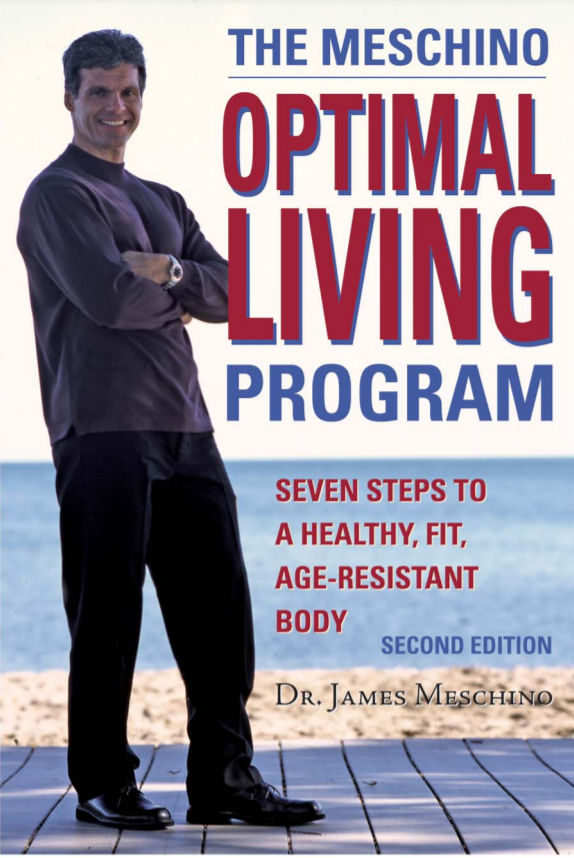
How to Preserve Your Willpower from Day-to Day
Today's Will Power Moment - 30
with Dr. James Meschino
At some point, just about everyone sets wellness goals for themselves. They vow to lose weight, they swear off eating certain foods, purchase a gym membership to get in better shape, or buy home exercise equipment they plan to use regularly. We all get inspired, from time to time, to make changes that we know will serve our best self-interest and future health status.The challenge for most people is to sticking with those changes as most people don’t. They want to, but they don’t.
It’s challenging to follow through because each day we get up, we are faced with many, many in-the-moment decisions where we have to decide whether to stay on track or allow ourselves to be pulled off it. For example, one study asked study participants how many food-related decisions they thought they made in one day. The average person guessed fourteen. In reality, when the study participants’ food choices were actually tracked, the average was 227. That’s 227 food decision-making moments in one day, which is quite a lot of decisions on just one subject matter in a day. What’s become clear here is if you’re not in the right mindset, it becomes very easy to start making bad decisions, or decisions that are inconsistent with your long-term wellness goals.
Studies show that being able to make good decisions in any moment depends on the state of what’s known as one’s “willpower reserve”, or current capacity for self-control. Many factors can decrease the state of one’s willpower reserve from day to day, especially things that cause the mind or body stress. Studies show that feelings of anxiety, anger, depression and loneliness are all associated with less self-control. Chronic pain, fatigue, and illness can also deplete one’s willpower reserve. In addition to these things, being distracted and hyper-stimulated (common states of mind in today’s multimedia age) also weakens our willpower reserve in-the-moment. When the mind is preoccupied, impulses, and not long-term goals, are more likely to guide choices. For example, distracted shoppers are more susceptible to in-store promotions, or purchasing items not on their shopping list. Retailers use distraction strategies to their advantage all the time. In one experiment, students distracted by the instruction to memorize some information, were 50% more likely to choose chocolate cake over fruit at a snack cart during the memorizing phase of the experiment. By the same token if you’re standing in line at a coffee shop texting a friend, you might be more inclined to order the high-fat muffin or pastry with your coffee when you it’s your turn to order. When we get distracted, or are in the middle of multi-tasking, or in any hyper-stimulated state (i.e. at a fun, social gathering), our capacity for self-control often decreases. Our willpower reserve can be easily weakened by any of these things and we become susceptible to eating foods we swore off of. Or we skip our workout that day.
But all is not lost! Studies prove that it is possible to maintain our willpower and enable ourselves to easily overcome daily temptations and stay on track. But we need the right strategies: the ones proven to work in human behavioural studies. For today, however, I would just like to drive home the point that setting wellness goals for improved diet and exercise is going to come with a series of challenges that can easily weaken your willpower reserve and veer you off track. Unless you identify your personal vulnerabilities and put a plan in place that helps you preserve your willpower reserve on a daily basis, your chances of staying on track are pretty slim. To take a moment to think about what things specifically weaken your personal self-control when it comes to food and exercise choices. For each of us it’s different. If you can identify your own weakness, then through self-awareness you can catch yourself in the moment and hopefully start making better decisions.
In the next edition of Today’s Willpower Moment, I will share with you the 4 Proven Strategies to Strengthen Your Willpower Reserve, but for today, let’s just identify which factors you know are the ones that are most likely to reduce your self-control, prompting you to reach for the wrong foods, or skip your exercise routine.
Maybe this will help: Perhaps it when you are distracted or in the midst of multi-tasking at work or at home. Or is it when you feel a bit lonely, bored, depressed, sad, angry, or when you feel anxious about how something will turn out? Is that when you stuff your face with treats and snacks, or get so caught up in those feelings that you lose your enthusiasm to put on your running shoes and go for a run or ride your stationary bike for 30 minutes? Or is it when you are in a hyper-stimulated state, like at a social gathering where you find yourself nibbling on potato chips? Or is it when you are watching TV or messaging or texting with your smart phone or tablet, or eating the high-fat muffins offered at a business meeting? Or is it when you feel physically tired or exhausted? When exactly do you feel most vulnerable to sitting down and eating comfort foods rather than getting the exercise you know would make you feel better? Which of these come up for you?
We all have our challenges. Identifying the ones that affect us personally, can really help us catch ourselves when these things surface – in the moment – hopefully preventing us from making the less healthy choice. For me, it’s primarily when I feel tired, run-down or overwhelmed. Those things can derail me, so I stay on the lookout for those feelings and try to catch myself in those moments when I know I’m a bit vulnerable. And I have a plan to keep those feelings in check when they do arise. So, In the next edition of Today’s Willpower Moment, as promised earlier, I will share the 4 Proven Strategies to Strengthen Your Willpower Reserve with you, enabling you to preserve your willpower and help you overcome your personal vulnerabilities on a day-to-day basis. They are very simple – and a highly effective proven MDMS formula. Once you learn it, you will have no trouble remaining in the optimal mental and physiological state required to achieve your wellness goals, and resist the in-the-moment temptations of daily life that can so easily derail you.
Stay tuned in, and I’ll see you next time!
Dr. James Meschino
DC,MS, ROHP

Dr. James Meschino
ABOUT THE AUTHOR
Dr. James Meschino, DC, MS, ROHP, is an educator, author, and researcher having lectured to thousands of healthcare professionals across North America. He holds a Master’s Degree in Science with specialties in human nutrition and biology and is recognized as an expert in the field of nutrition, anti-aging, fitness, and wellness as well as the author of numerous books.



